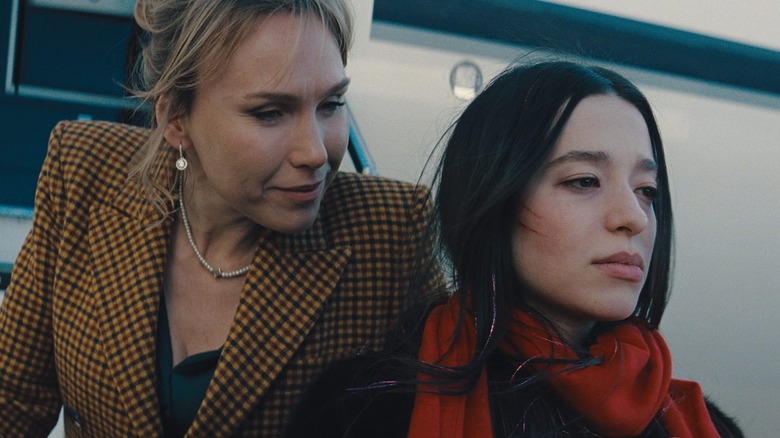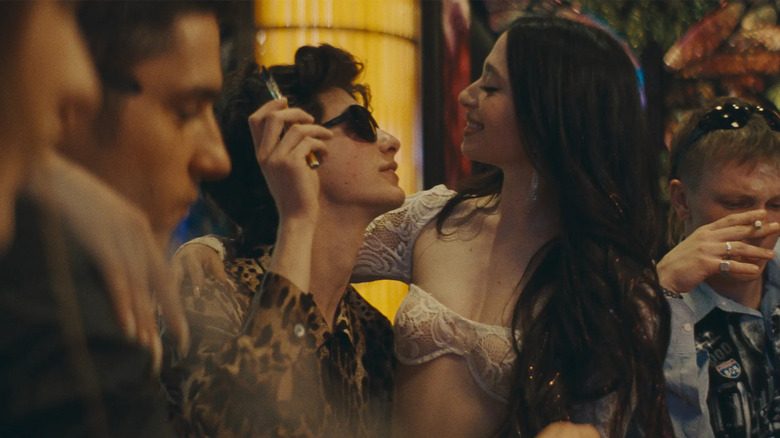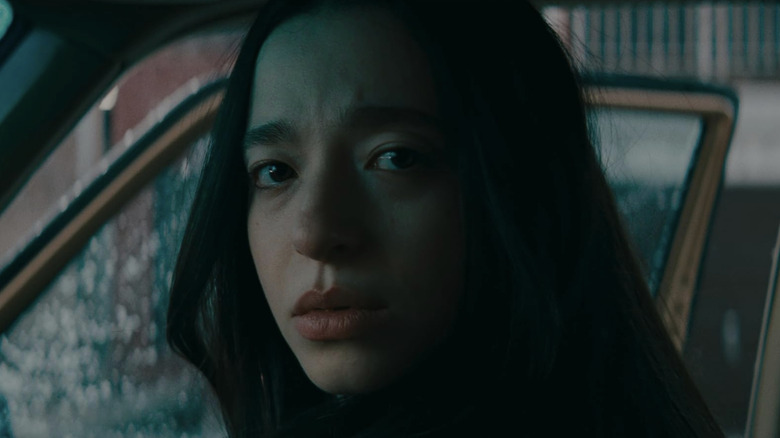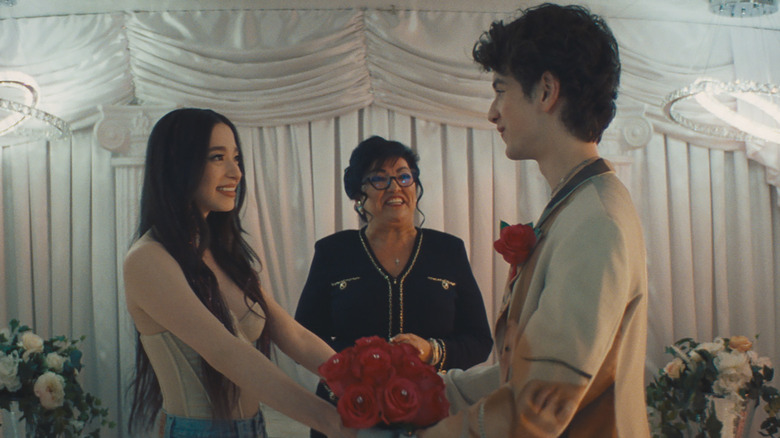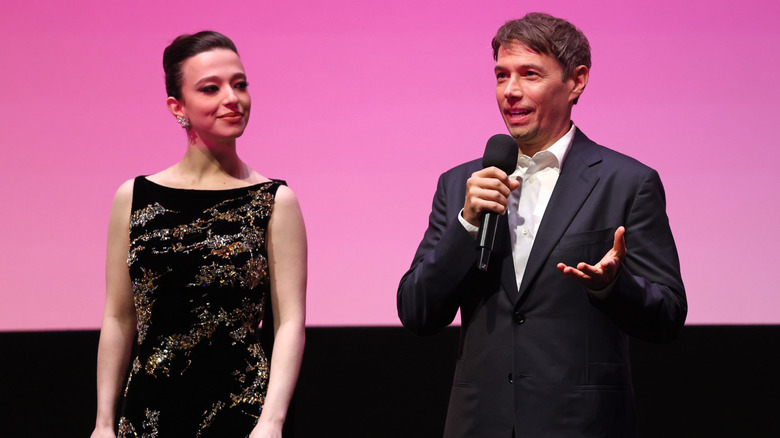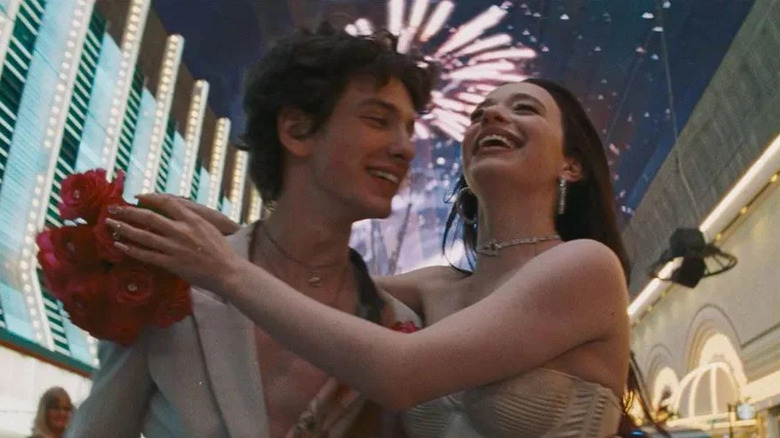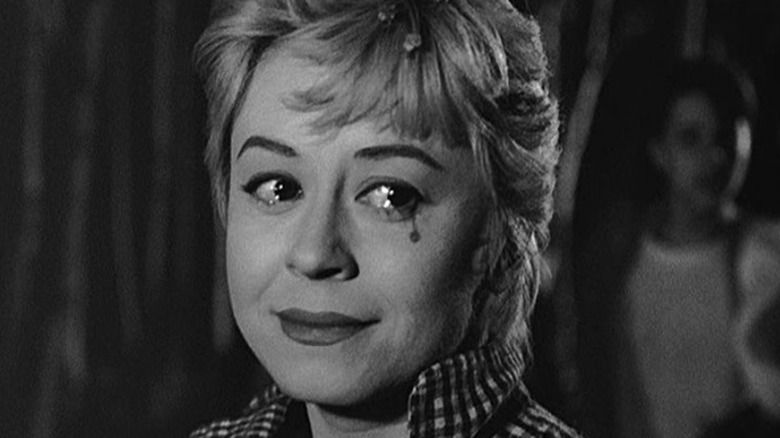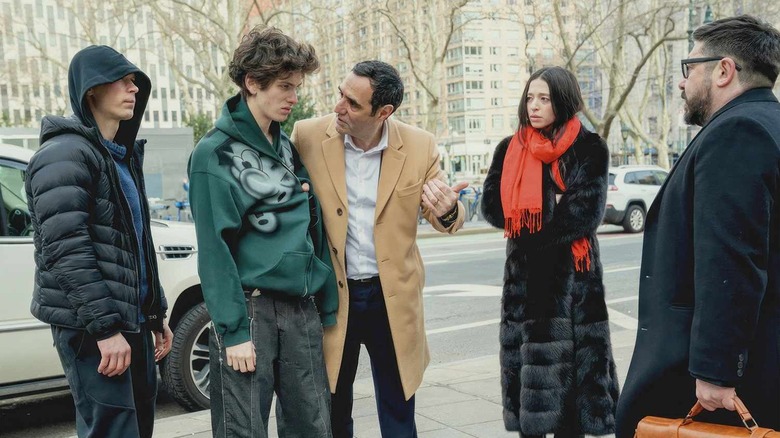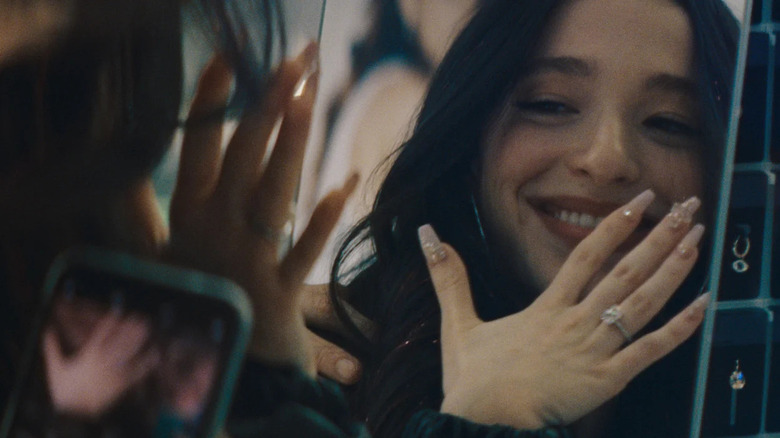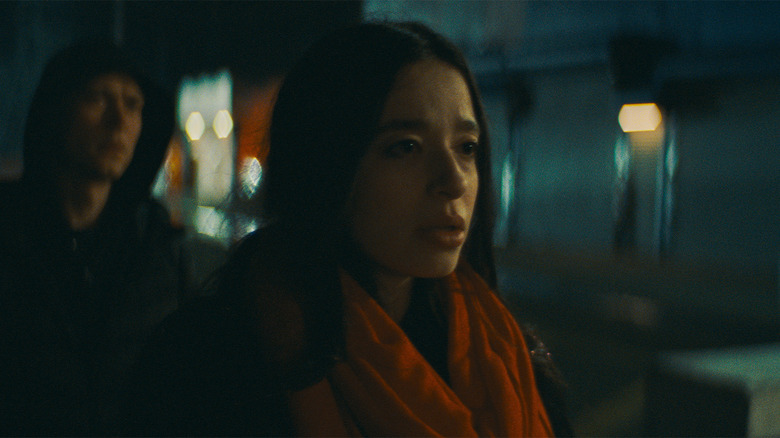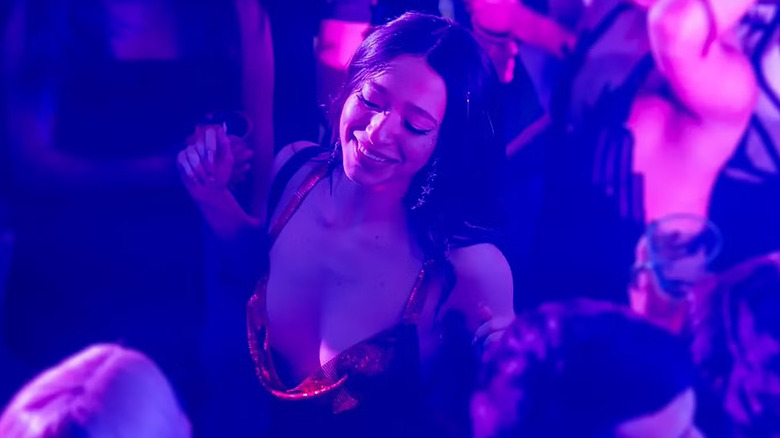Anora Ending Explained
We can't talk about great movies from 2024 without talking about "Anora." Written and directed by Sean Baker, the story follows Anora "Ani" Mikheeva — played by the outstanding Mikey Madison — an exotic dancer who meets a young man, Ivan "Vanya" Zakharov (Mark Eydelshteyn) at the club one night. After a whirlwind romance, Ani thinks she's getting her happily ever after ... until Vanya suddenly betrays her, sending her on a lengthy chase throughout the boroughs of Manhattan.
"Anora," which won the coveted Palme D'or at the 2024 Cannes Film Festival, ended up scoring up multiple Oscar nominations — including best picture, best director, editing, and screenplay for Baker, best actress for Madison, and even a supporting nod for Madison's third-act co-star Yuri Borisov. So what happens at the end of "Anora," and what did it mean? What have Baker and Madison said about the film's emotionally resonant ending, and what should you make of it when you watch this funny yet devastating film?
What you need to remember about the plot of Anora
Before we get ahead of ourselves, here's the basic plot of "Anora." One night at work, Ani is asked to tend to a patron who speaks Russian, the aforementioned Vanya ... and it turns out that Vanya is the wealthy, spoiled son of a Russian oligarch with money to burn. After meeting her at the club, Vanya starts paying Ani to come to his home and, at one point, offers her a hefty sum to be his "girlfriend" for a week; when the two end up in Las Vegas with all of Vanya's friends to drink and gamble, they impulsively get married at a Vegas chapel, and Vanya presents Ani with an enormous engagement ring.
Unfortunately, Vanya's marriage proposal — and subsequent marriage — does not go over well with his rich and powerful parents, who send a series of goons to the Zakharov family compound in Brighton Beach, Brooklyn to collect him. He makes a run for it, sending Ani, Igor (Yuri Borisov), Toros (Karren Karagulian), and Garnik (Vache Tovmasyan) — the guys being the goons — on a wild goose chase to find him. When they track Vanya down, he's back at the club with another woman, infuriating Ani, but she's still determined to stick it out with Vanya until his parents tell her, in no uncertain terms, that the new couple will get their marriage annulled.
What happened at the end of Anora?
Ani puts up a valiant fight against the powerful Zakharovs — Vanya's parents Nikolai and Galina, played by Aleksei Serebryakov and Darya Ekamasova — for a while, trying to ingratiate herself with them by speaking Russian ... but ultimately, Galina wins out by telling Ani that unless she agrees to annul the marriage so that Vanya can return to Russia with his parents, and Ani finds herself utterly betrayed by Vanya's immaturity and unwillingness to support her. Ani watches as Vanya leaves on a private jet with his parents, and Igor brings Ani back to the Brighton Beach mansion — which she previously moved into — to collect her belongings.
The two have potentially the weirdest heart-to-heart in cinematic history — Ani is openly hostile to Igor, who seems to take all of her insults and accusations in complete stride — and when Igor brings Ani back to her house the next morning, he presents her with the engagement ring that he stole back from the rest of the Zakharov goons. Ani initiates a sexual encounter with Igor in response, but just as he tries to kiss her, she breaks down crying, and Igor holds her as the film ends.
The ending of Anora is much more romantic than many people realize
Since its release, "Anora" has been called a romantic comedy, and though some might deny it, that's true. "Anora" is frequently very funny, yes, but there's also a love story here, and it's not the one you think. Yes, Vanya is the one who sweeps Ani off her feet, presents her with a huge diamond, and marries her, but since we see what happens after the fairytale ends, that's not the love story. The real romance in "Anora" is between Ani and Igor.
Vanya is, to put it somewhat kindly, nothing more than a caricature of a human being; as soon as Ani becomes inconvenient to him, he abandons her, because she's nothing more than an object to him (one that he can purchase, specifically). Despite the fact that Ani kicks the absolute crap out of Igor when he first storms into the Zakharov mansion, he's incredibly tender towards her — he hands her a scarf when she's cold, is strangely protective of her, and clearly respects her as a person and not simply as a trophy to be bought or won. The moment between Igor and Ani at the very end of the movie, especially because it's preceded by their last night at the mansion, is where you can find the real romance in this story. Both Ani and Igor know what it's like to be looked down upon by the Vanyas of the world, and when Ani tries to show her appreciation to Igor with sex and he shows her true emotion in return, it breaks down her defenses for the first time in the entire film.
At the end of her exhausting journey, Anora experiences a moment of catharsis with the audience
The ending of "Anora" explains the movie's essential love story — and exposes its heart — but it's also a moment of pure catharsis for both Ani and the audience, largely because the entire film is a madcap race to the finish. This isn't to say that "Anora" isn't well paced; it is! It just moves very quickly, especially when Ani, Igor, Toros, and Garnik chase after a frantic (and drunk, and high) Vanya and spend the entire night looking for him across Brooklyn.
That moment in the car between Ani and Igor is, as was previously established, the moment that all of Ani's defenses fall ... but it's also the first moment that the girl gets to take a breath for seemingly the movie's entire run-time. She's not performing for Vanya or anyone else, nor is doing a ton of mental math to figure out what to do next. She just is, and it's an enormous relief for both the character and viewer.
Sean Baker arrives at his endings in a fascinating fashion
So how did writer-director Sean Baker, known for projects like "Tangerine" and "The Florida Project," figure out the perfect ending for "Anora?" As he told Robyn Kanner at The Verge, he always figures out the final moments of his films first and goes from there.
"Well, endings for me are number one," Baker told Kanner when she asked about "sticking the landing on a film" and the difficulty of that particular feat. "They're the most important thing. It's what you're leaving the audience with. It's what they're going to be talking about minutes later when they leave the theater, and I always have to come up with the ending before even putting one word on paper. I have the beginning, middle, and end, and I figure out that ending, first and foremost. In this case, it was very stressful because I was asking for a lot." The ending is such a perfect, quiet, devastating, and somehow romantic encapsulation of everything that happened in "Anora" up until Ani's arrival back at home ... and it actually makes sense that Baker thought of it before writing anything else.
After Anora, Sean Baker wants people to discuss the ending
If you found yourself particularly struck by the ending of "Anora" — and perhaps have some follow-up questions about what it all means — that's precisely the reaction Sean Baker wanted from his audiences. In October of 2024, just before the film's wide release (its Cannes premiere was in May of that year), Baker spoke to Vanity Fair, who pointed out that the ending can certainly be interpreted in a wide variety of ways (some of which, it should be said, are less charitable than others).
"I've been hearing a lot of different interpretations regarding the ending, and some are jaw-dropping, I have to say," Baker said, though it feels important to note that he didn't elaborate on why these thoughts made his jaw drop (and we wish he would have!). "But what I appreciate about it is that everybody seems to be wanting to discuss it and that was the point of that last scene. I think unfortunately audiences have been conditioned to be told everything and be told what to think. It's kind of sad sometimes when I hear from people saying, 'why didn't you tell us what exactly is going to happen?' I don't know—my favorite films, they never do."
According to Sean Baker, the audience writes Anora's ending
Then, just after the wide release of "Anora," Sean Baker sat down with NPR's Eric Westervelt to discuss the entire film in a piece for Weekend Edition, covering everything from Ani's backstory to the fact that Baker's projects frequently center on sex workers. That's when Westervelt addresses the ending, saying, "I don't want to give away any spoilers here, but the end of 'Anora' is powerful, and it's really, you know, as affecting as anything I've seen on screen in recent memory. Is it possible for you to touch on – what were you striving for there?" (Westervelt, in this writer's opinion, has the right idea calling the ending "affecting.")
After thanking Westervelt and saying that the endings of his movies are of the utmost importance to him because it's the last image given to the audience as they leave, Baker expanded on the romantic and intimate nature of the last interaction between Ani and Igor. "For this moment, I think it's a moment of intimacy that we haven't seen earlier in the film. There's a catharsis there," Baker explained. "It's been very interesting to hear the interpretations of the last scene. That's how it's designed because it's really not leaving you with any solid answer of what's about to come in Ani's life."
Not only that, but Baker said the audience's interpretation is actually the most important thing: "It's really up to the audience at that point to sort of write the ending. And it's been really incredible to see that that's what's been happening."
Sean Baker used a classic Fellini film to inspire the ending of Anora
All truly great filmmakers take inspiration from classic films from decades past, and it's not unusual for those filmmakers to pay homage to them — which is precisely what Sean Baker did in the ending of "Anora," according to IndieWire. During the scene between Ani and Igor, one single tear rolls down Ani's cheek after her emotional dam finally, finally breaks. Unless you're a huge fan of Federico Fellini — and perhaps you are! — you might not know about the ending of the Italian master's 1957 film "Nights of Cabiria." As that movie comes to a close, sex worker Cabiria (played by Fellini's wife Giulietta Masina), realizing that yet another man has betrayed her, sheds a lone tear stained with mascara.
There's a major difference here, in that Cabiria looks into the camera and engages with the audience while she cries, whereas Ani doesn't have one final look to challenge the audience; "Anora" simply leaves her with Igor, knowing that Ani, a fighter, will survive. Still, if you really loved "Anora," you'll definitely want to check out "Nights of Cabiria" and see what inspired Baker.
Shooting Anora's ending was logistically quite difficult
Now that you know how vital the ending of "Anora" was to Sean Baker — and what inspired him — let's talk about how it was, apparently, wildly difficult to shoot (and took way longer than expected). In that same IndieWire piece, Baker's wife (and producer) Samantha Quan revealed that the film crew shot on location in Brighton Beach (and also lived there while shooting the movie), and Baker's other co-producer Alex Coco said that filming the car scene with Ani and Igor took way more time than they thought.
"What we didn't know is that it would take three days to shoot," Coco told the outlet. "The choreography around that scene was not just the performances. It was also the entire crew around the car trying to keep this intimate-feeling space inside the car where they were just alone. We had two camera moves. We had our production designer [Stephen Phelps] on the hood of the car with a box full of fake snow, dumping it by the window, trying to get it to collect. I'm trying to deal with the police, because we're going over time, to not kick us out... Everybody held their breath and just prayed for five minutes, like please let everything line up." Clearly, they figured it out — and the result is pretty spectacular.
Mikey Madison believes the ending of Anora forces the audience to reflect
We've heard a lot from Sean Baker and his producers, but what does star Mikey Madison, who visited strip clubs and perfected a Brooklyn accent to prepare for her role, think of the ending of "Anora?" A month after the film came out, Lauren Puckett-Pope spoke to Madison for Elle, and the actress said that she got a "pit in her stomach" when she first read the ending in Baker's script. "I was very moved by it," Madison told Puckett-Pope, saying that she "felt that everything that I was going through, and that the character [was going through], was combined in that moment."
Madison also said that she thinks the ending makes the audience reflect on who they are, and that their interpretation could say a lot about each person who sees the film. "I feel like everyone, when they watch the film, could have a certain explanation as to what [Ani] wants or how she feels or what she does at the end," Madison mused. "It's really interesting to hear other people's perspectives, because I often feel it's a reflection of them...It's a reflection of, kind of, who you are."
Not only that, but Madison has her own reading of the ending of "Anora" — which makes sense, obviously, considering that she's the one who brought the character to life. "I have my own specific feelings about it and what she wants," the Oscar-nominated actress concluded. "There's a lot of hope involved, a lot of fighting for what she believes is hers...I hope that people love and that they feel some empathy for her. I want people to feel—whatever feeling it is—that they feel it strongly."
Men and women have reacted differently to the ending of Anora
In that same Elle interview, Mikey Madison revealed something pretty fascinating — which is that there's a gender divide related to how audiences experience "Anora," and people who have seen the film approach her with their reactions. "Men and women have very different reactions [to the ending]," Madison told Lauren Puckett-Pope. "I remember there was this one man—I personally think this was kind of a disgusting perspective—but he said something like, 'Oh, so your character is trying to get pregnant so that she can go back to Ivan and claim some of his money.' I was thinking about it, and I was like, 'Wow, that's really a reflection of how he views the character and his perception of, maybe, just women in general.' It was really eye-opening for me."
While this is both surprising and unsurprising, Madison didn't mean to claim that every male audience member had an uncharitable or unkind reading of Ani and the movie's ending; she did say women are more understanding. "Some men, I think, have a more compassionate response or feeling about the ending," Madison concluded. "But I often feel that women are the most compassionate or thoughtful, in regards to what [Ani's] going through emotionally in the end."
Will there be a sequel to Anora?
No, and there shouldn't be! "Anora" is a closed loop narrative perfectly designed by Sean Baker, who shows us the rise and fall of Ani and Vanya's superficial "love story" and the crashout that occurs when Vanya makes a run for it. We watch Ani experience the highest highs by Vanya's side — even as it seems relatively clear that she understands that he's immature and surface-level, she still lets herself get lost in the fantasy — and see her come down from those highs as she's shoved into the back of an SUV and traverses Brooklyn trying to find her runaway husband.
Luckily, Baker doesn't seem like the type of director to produce a sequel just because one of his movies did particularly well — so the idea of him making "Anora 2" feels borderline impossible. Still, it shouldn't ever happen; Ani's story is over. If you want to watch or re-watch "Anora," it's available to rent or buy on major streaming platforms now.
